#Jon Peterson
Explore tagged Tumblr posts
Text
DC comics cameo
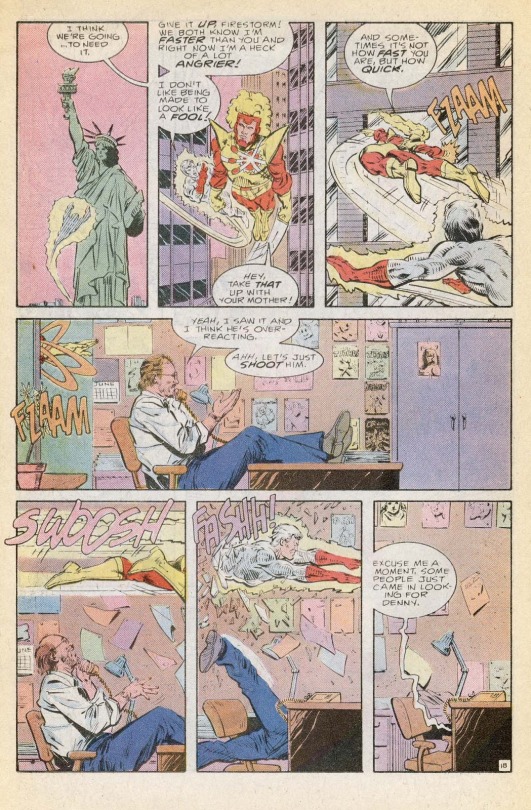

#firestorm#ronnie raymond#captain atom#nathaniel adam#dc comics#john ostrander#Barbara Randall#Jon Peterson#Denny O’Neil#Joe Brozowski
3 notes
·
View notes
Note
One small correction based off of playing at the world, war games started with heavy use of randomizers, then went diceless for many years based on the influence of a very well respected German general. However American war games were an offshoot of the earlier dice based German branch via the influence of Tottenham.
This is very much a summary of like two chapters of the book that chart the exact influence of every war game on every other war game.
It is totally correct that there was a lot of argument in military circles about rulings versus rules he and the 19th century. There was also a lot of argument about how complex the rules should be and realism versus ease of play.
What I did find fascinating is how much of the complexity of those wargames simply came from trying to do percentages using only six-sided dice, and how if polyhedral dice had been available the history of wargames may have been very different because you cook drastically cut down how many tables you needed to cross reference.
Edit: removed some text to speech errors. Also I encourage anyone interested in the history of either war games or role-playing games to check out Playing At The World, the second edition comes out this summer so you'll no longer have to pay over $100 for a used copy or order it by interlibrary loan (how I read it).
This book chronicles where every single rule in chainmail was borrowed from, the first edition didn't include the magic rules so he thought that was a Gygax original, but since then he found an exact version of them from an earlier wargame from an incredibly rare zine.
Honestly it's weird that roleplaying as we know it evolved from historical wargaming.
Like for example DBA rules contain some suggestions for running campaigns with narrative and "propaganda" so I wouldn't say that it's something incompatible, and 0E looks way more like wargames than say PbtA games do, but storytelling games were a feature of artistic salons for way longer and they appear much closer to roleplaying than rulesets for reenacting ancient battles on tabletop.
Salon games didn't have skill checks but neither did wargames and it's strange that nobody came up with simplistic skill checks to add uncertainty and realism to the game
I think the line is a lot clearer when the role of dice and rules in tabletop roleplaying games is correctly understood.
"Uncertainty" and "realism" are, at best, secondary to what the dice are actually doing. Even most tabletop RPGs get it wrong when they try to explain themselves – they'll talk about the rules as something to fall back on to prevent schoolyard arguments (i.e., "yes I did!/no you didn't!") from derailing the story, when in fact it's the exact opposite.
If we look at freeform roleplaying as an illustrative parallel, we see that, while newly formed groups may in fact fall to bickering when a consensus can't be reached about what ought to happen next, mature and well-established groups tend instead to fall prey to excessive consensus-seeking: the impulse to always find an outcome that isn't necessarily one which everybody at the table can be happy with, but at the very least one which everybody at the table can agree is reasonable – and that's a lot more constraining than one might think.
In this sense, the role of picking up the dice isn't to build consensus, but to break it – to allow for the possibility of outcomes which nobody at the table wanted or expected. It's the "well, this is happening now" factor that prevents the table's dynamic from ossifying into endless consensus-seeking about what reasonably ought to happen next.
Looking to the history of wargames, this is precisely the innovation they bring to the table. Early historical wargames tended to be diceless affairs which decided outcomes by deferring to the judgment of a referee or other subject matter expert, but the use of randomisers increasingly came to be favoured because referees would tend to favour the most reasonable course, precluding upsets and rendering the outcomes of entire battles a foregone conclusion. This goes all the way back to the roots of tabletop wargaming – people were literally having "rules versus rulings" arguments two hundred years ago!
(This isn't the only facet of tabletop roleplaying culture which has its roots in wargaming culure, of course. For example, you can draw a direct line from the preoccupation of early tabletop RPGs with punishing the use of out-of-character knowledge to historical wargaming's gentleperson's agreement to refrain from making decisions based on information that one's side's commanders couldn't possibly have possessed when re-creating historical battles.)
To be clear, I don't necessary disagree that salon games could have yielded something like modern tabletop RPGs. However, first they'd have had to arrive at the paired insights that a. excessive consensus-seeking is poison to building an interesting narrative; and b. randomisers can be used to force the breaking of consensus, and historical wargames had a substantial head start because they'd figured all that out a century earlier.
1K notes
·
View notes
Text
youtube
RPG and tabletop gaming historian Jon Peterson returns for a fantastic conversation on D&D and RPG history, and his related current books and projects. A new edition of Playing at the World and Dungeons & Dragons - the Making of Original D&D: 1970-1977 are on the shelves. D&D 4E has its hardcore fans. Jon has a seriously impressive collection of documents related to RPG history. Jon’s first on-screen RPG game, ever. Does the role of the Caller in D&D get an unfair reputation (and what exactly does the Caller do)? DNA from non-RPGs like Outdoor Survival made it into early D&D. Be careful of the question “what is a role-playing game”, the debate can sideswipe an entire conversation. Plus much more.
0 notes
Text
Started reading the Illusive Shift by Jon Peterson.
I noticed this fact.
"4d6 drop lowest" for attribute generation was first used in 1975 by Los Angeles D&D player Sherna Burley.
This innovation comes 4 years before a similar rule would be published in the first Dungeon Master's Guide.
We're still using it today.
0 notes
Text
One D&D's New Covers
The two images illustrate the fundamental split over what players think Dungeons & Dragons is for

View On WordPress
#art#cover art#covers#D&D#dnd#dungeons and dragons#elusive shift#games#gaming#jon peterson#one dnd#roleplay#rpg#rpgs#rules#wotc
1 note
·
View note
Text


"I am hoping the artwork calls to mind monochromatic publications from the earlier days like “The Strategic Review” and Fanzines" - Erol Otus on his cover for Playing at the World, 2E - Vol. 1: The Invention of Dungeons & Dragons, by Jon Peterson.
Here's the MIT Press blurb:
The first volume of two in a new, updated edition of the 2012 book Playing at the World, which charts the vast and complex history of role-playing games.
This new edition of Playing at the World is the first of two volumes that update the 720-page original tome of the same name from 2012. This first volume is The Invention of Dungeons & Dragons, which explores the publication of that iconic game. (The second volume is The Three Pillars of Role-Playing Games, a deeper dive into the history of the setting, system, and character creation of D&D.) In this first volume, Jon Peterson distills the story of how the wargaming clubs and fanzines circulating around the upper Midwest in the 1970s culminated in Gary Gygax and Dave Arneson's seminal role-playing game, D&D. It augments the research of the original edition with new insights into the crucial period in 1972–1973 when D&D began to take shape.
Drawing from primary sources ranging from eighteenth-century strategists to modern hobbyists, Playing at the World explores the origins of wargames and roleplaying through the history of conflict simulations and the eccentric characters who drove the creation of a signature cultural innovation in the late twentieth century. Filled with unparalleled archival research (from obscure fanzines to letters, drafts, and other ephemera), this new edition of Playing at the World is the ultimate geek's guide to the original RPG. As such, it is an indispensable resource for academics and game fans exploring the origins of the hobby.
1 note
·
View note
Text
I need this.

Check out this sweet Otus cover for the new 2nd edition of Jon Peterson's Playing at the World. You can pre-order a copy here.
46 notes
·
View notes
Text



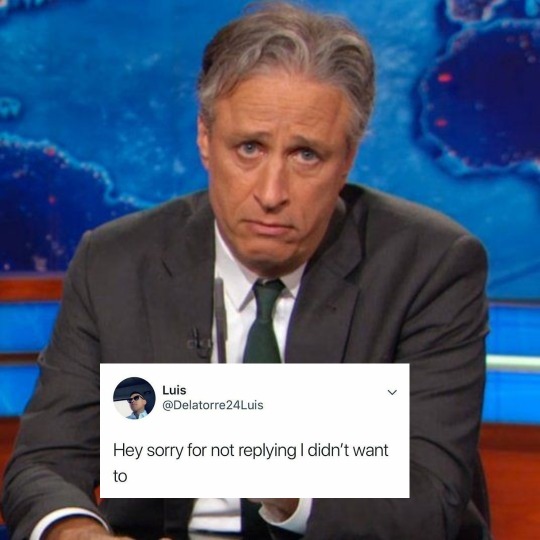




*crawling out of the gutter to hand you these*
#hi everyone i present: meme#YOU THOUGHT I WAS DONE MAKING MEMES???#I'm like that fnaf motherfucker. i always come back#stephen colbert#craig ferguson#john oliver#geoff peterson#jon stewart#jimmy kimmel#conan o'brien#seth meyers#taylor tomlinson#strike force five#strike force eight#strike force memes#late night#last week tonight#conan o'brien must go#conan#late night with seth meyers#jimmy kimmel live#the late show#the colbert report#the late show with stephen colbert#the daily show#the daily show with jon stewart#the problem with jon stewart#after midnight#strike force#strike force text posts
294 notes
·
View notes
Photo

encountering jesus at the supermarket
#oc#ocs#original character#original characters#artists on tumblr#saltyarts#naz of arizona#per peterson#andrew peterson#jimmy of the canyon#jon the dutiful
241 notes
·
View notes
Text
The Morning Show episode 3.10 "The Overview Effect"
The season of Alex Levy! It’s been awhile since I really felt proud of a character the way I feel proud of her. It’s also not too often in shows that you get to see a character grow and actually implement that growth. Typically, a character ‘learning their lesson’ marks the end of the story, but The Morning Show has a really unique pacing that does wonders for character development. They all contain multitudes and nuance and flaws and strengths, and that complexity of every individual is the exact thing that fuels the chaos behind this show.
I also think this show is slept on for some reason? I never hear anyone talk about it which confuses me with this kind of cast. From what I gather, it does too good a job capturing all the problems in our society and that’s a downer. I’ve always been impressed by that quality about it, the whole thing would feel silly if it didn’t feel authentic. But for anyone who feels that The Morning Show is just a stressful and sad reminder of the state of US capitalism and media- this season surprised me by building to an incredibly hopeful and empowering conclusion. One all about growth and accountability. I honestly feel like I have a better understanding of what the phrase “doing the work” actually looks like in the context of social justice and power after watching this.
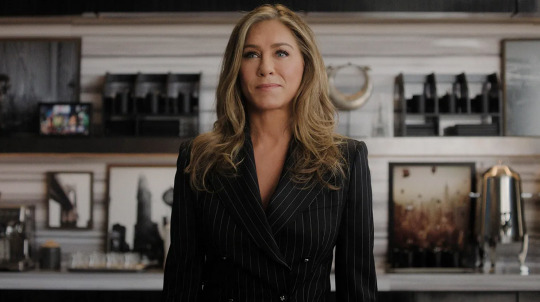
Jennifer Aniston in "The Overview Effect". Image courtesy of The Hollywood Reporter.
Before this season’s finale, my opinion was leaning the complete other way. Bradley, who I’ve always identified with and loved, covered up her brother’s involvement January 6th. Hal wasn’t just there; he attacked a cop- and people were looking for him. Bradley didn’t just discretely ignore it, she doctored him out of footage, lied to the FBI, and continued reporting on the event. To me, she lost all her ethical standing with this, and she continued doing the news for a long time before anyone found out. As Laura Peterson told her, “It’s obscene”.
But then again, Laura only found out about it by scouring all of Bradley’s leaked emails and texts in search of evidence of Bradley sleeping with Cory. Before Alex got involved during “The Overview Effect”, I was rolling my eyes at the both of them. It was screaming ‘liberals who can’t get off their high horse but also aren’t ethical in their own lives when it really comes down to it’. Laura being so insecure about Bradley sleeping with someone when they weren’t even together to the point that she would violate her privacy like that felt incredibly low for Laura. Almost out of character. Her finding out about the Hal situation and her subsequent breakup with Bradley is what catalyzed the climax of this season, but I really wish she had found out some other way.
Nonetheless, I saw a glimmer of hope for Bradley when she resigned on-air. It was dramatic, as she and Alex both often are, but it was a step towards accountability. Losing her girlfriend, her job, and potentially the rest of her career made me feel like she is, indeed, paying the price for her choices.
Something else also happens here that manages to put Bradley’s transgressions in perspective. Paul Marks stops by Bradley’s green room right before what would be her final broadcast, blackmailing her with his knowledge of how the January 6th cover up could blowback on Laura, and telling Bradley to stop digging into Hyperion. “The Overview Effect” opens with Paul blatantly (to us) lying to Alex about that conversation, telling her instead about the support he offered Bradley in that moment.
Paul Marks was a great character addition this season. They planted the seed well that he was ‘not what he seemed’ and had something going on with Hyperion, his independent space company that was working with NASA. Stella had an old friend who tried to blow the whistle, but Stella really straddles the line between empowering from the top down, as she claims to do, and simply playing the game. She scared the friend away, and so enlisted Bradley and Chip to help her get to the bottom of whatever it was that she now regretted ignoring. All we knew for most of this season was that he didn’t assault anyone- he was “too smart” for that- but he sure did something, and absolutely no one would come forward.
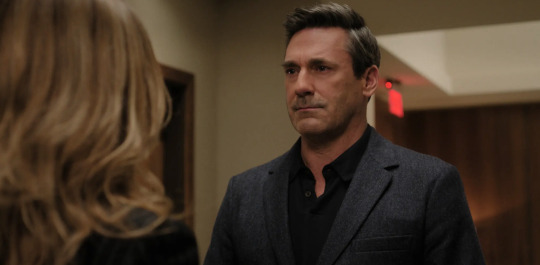
Jon Hamm and Jennifer Aniston in "The Overview Effect". Image courtesy of TV Line.
The chemistry between Jon Hamm and Jennifer Aniston is really the thing that made him- and her- compelling. It was so genuine, and his affection for Alex is the one thing about him that I do still believe to be true. I’ll say it, he had great charisma and calming DILF energy. Without knowing what exactly he had done, the smitten part of me wanted to believe that it was nothing. Seeing that side of him, understanding what Alex saw in him, makes what she does in this episode all the more impressive.
Ever since her live resignation, Alex has been texting and calling Bradley to no avail. After her conversation with Paul, the one where he lies through his teeth, Alex decides to go check on her. When she shows up at her apartment, Bradley looks unhinged. Disheveled and manic, Bradley tells Alex she can come in if she leaves her purse and phone in the hall. Alex obliges, and when Bradley gets talking, it all makes horrifying sense.
Bradley admits to everything about January 6th, but then says something else- Paul knew about it too, and in their conversation, he referenced things he could only know if he had been listening to her fight with Laura. Alex is shocked, but, to her immense credit, not disbelieving. Bradley says she’s going home to West Virginia for awhile to take care of things with her family. Alex leaves, wrapping her head around the possibility that Paul is surveilling Bradley- and who knows who else. On the way home, she texts Bradley that getting away for a bit is a good idea, and that she should go back to West Virginia. After a moment of thought, she changes West Virginia to Hanover, a place they didn’t discuss, and hits send.
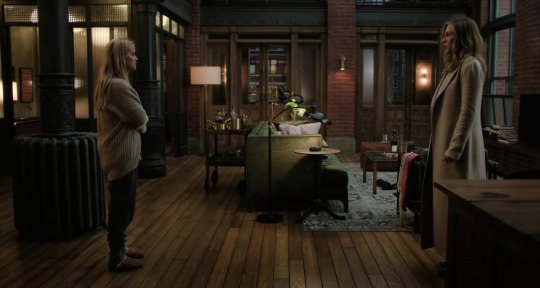
Reese Witherspoon and Jennifer Aniston in "The Overview Effect". Image courtesy of IMDb.
Alex’s little experiment proves fruitful. She gets back to her apartment and tells Paul that she went to visit Bradley. They chat about it, Paul playing a supportive boyfriend. So supportive that he wraps Alex in a hug and says Alex is right, Bradley should get away for a bit, go back to Hanover and recoup. Alex freezes. She doesn’t give herself away though. She agrees, hugs him back, and spends the night sharing a bed with someone that we and she now all know is very scary.
Then she pays a visit to Laura. A plan is formed, but we don’t find out about until the Hyperion-UBA deal is minutes away from going through. Right about as people are ready to start pouring champagne, Alex says there’s just enough time to put a counteroffer on the table. Laura has worked some magic at her network, NBN, and she and Alex are proposing a merger. They will share resources to save costs and form a true journalistic partnership.
Paul is caught completely off guard. He asks to speak to Alex in private, where they round a corner to come face to face with Stella and Kate- the original Hyperion whistleblower. They give Paul an ultimatum- walk away from the deal and come clean to NASA about sending them falsified reports on his rockets- or they will report on everything. Oh also- the transmission break when Bradley and Cory went to space? Not a broadcast issue, Paul cut the feed because the ship’s navigation system malfunctioned. Alex was absolutely right not to get on that thing. Also did this plot line remind anyone else of a certain submersible?
Paul, of course, accepts these terms because the alternative is life-ending, but he’s still flabbergasted at Alex’s turning on him. It’s a little sad, he really did love her and didn’t see it coming whatsoever, but not that sad because he was doing some fucked up shit.
For all of Cory’s heart attack-inducing running around this season, it was Alex single-handedly saving UBA multiple times over. She brought Paul Marks to the table, and she kicked him back away from it. And none of it was selfish. She was so thoughtful this season it blows me away. While Paul and Cory were both leaking scandals like chess pieces, Alex was processing them all with poise.
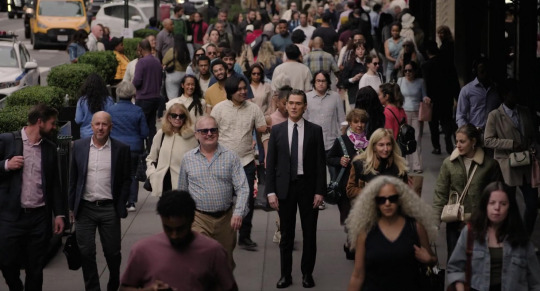
Billy Crudup in "The Overview Effect". Image courtesy of IMDb.
The idea that all the things that consume a news cycle, that prompt a notes app apology on Instagram and cost people their careers, are, at their source, a meaningless power play by executives with zero genuine interest, is the saddest thought posed this season. It was demoralizing to see Cory drop a bombshell and pretend to care about it when really all it meant to him was a successful board meeting. Knowing that origin of all these scandals, watching Alex, Chris, Mia, and Yanko put so much heart into thinking through these issues of race and pay inequality is just sad in some ways. The people at the top were preying on these ethics, on the outrage, on the news cycles, and people’s careful attempts to do the right thing were the very things executing Cory’s delicately laid plans.
Cory’s last-ditch attempt to reconcile with Cybil to save UBA really cements that all these issues of inequity meant nothing to him. He’ll go whichever way the wind blows. Alex, meanwhile, rejected Cybil’s pleas for allyship and engaged with her just enough to hold her accountable (“It isn’t just an email. You paid a black person less than a white person for the same job.”) She also knew when to take action and when to step back. She interviewed Paul on her own show and I truly don’t think their relationship ever clouded her work, but when Cybil was going to be interviewed, she was the one who arranged for it to be Chris doing the interviewing.
And in the end, Alex didn’t let a trail of injustices cloud her perspective. She was able to put what Bradley had done on the backburner for a moment, and get Laura to do the same, to tackle the wrongdoing of all wrongdoings. She did what Paul was relying on our society not being able to do- seeing through a scandal to its source. And she didn’t do it to save her own job- she was about to get the rebrand of a lifetime- she did it simply because it was the right thing to do.
But she didn’t forget about everything else. Before the credits rolled, Alex was holding Bradley’s hand as she and Hal stood outside an FBI office. Alex tells her it’s going to be okay, that she’ll be there for her, but that she has to do this. Bradley knows she does. This is what friendship should look like. Both unconditional support and accountability. I love this example proving that you don’t have to sacrifice one for the other. That someone can have room for growth, and they can do it by your side, with your support. That’s how we all get better.

Reese Witherspoon and Jennifer Aniston in "The Overview Effect". Image courtesy of IMDb.
I’m just so thrilled to see The Morning Show go this way. If you know me, you know I love a happy ending, and this may not be that, but it is hopeful, empowering, and motivating. And that’s what it’s all about, I think.
#the morning show#jennifer aniston#alex levy#reese witherspoon#bradley jackson#jon hamm#paul marks#billy crudup#cory ellison#tv#tv review#tv criticism#laura peterson#julianna margulies
13 notes
·
View notes
Text

Pirates of the Caribbean: The Pirates' Code Guidelines (2007)
Text: Monique Peterson, Jody Revenson & Jessica Ward -- Design: Jon Glick, mouse+tiger

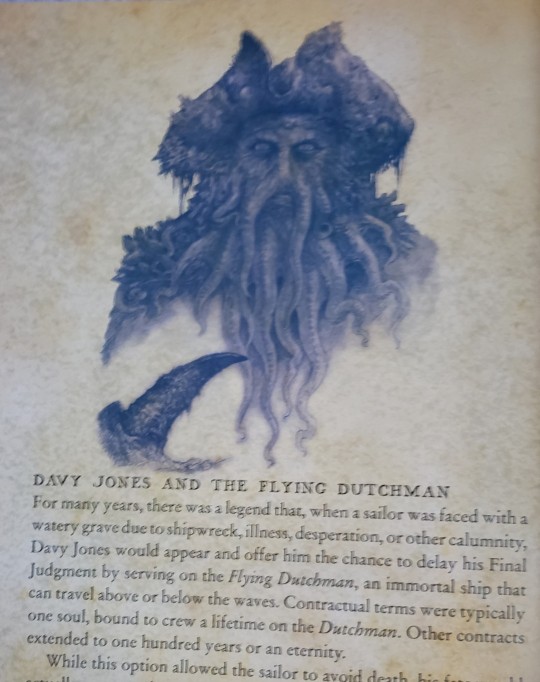


#pirates of the caribbean#potc#davy jones#mermaids#pirates#maps#joshamee gibbs#Monique Peterson#mouse+tiger#jody revenson#jessica ward#jon glick#disney#picture books#kid books#kidlit#children's books
21 notes
·
View notes
Note
we know what the guys favorite foods are, but what about they're least favorites?
Mark: HATES tomatoes, anything spicy, and sushi.
Ben: Pickles.
Jon: Take a guess. (It's cheesecake)
Kenny: He hates coconut. He also isn't a fan of coffee, but that's a drink lol.
#anon#ask#the mark side#tms#mark reed#benjamin washington#jonathon washington#kenny peterson#mark is my mortal enemy i fucking love sushi#jon too wtf who would hate cheesecake
6 notes
·
View notes
Note
Excellent point indeed. Here's what Jon Peterson says in Playing at the World, politely ignoring the colonial looting aspect of it all:
After the discovery of Tutankhamun’s bounteous resting place in 1922, the trope of hunting for treasure in ancient mausoleums took up permanent residence in popular culture, especially after its enshrinement in the film The Mummy (1932). The undead mummy personifies the widespread superstitions about a curse on those who plunder the riches of these sacred underworlds. This supernatural association is to be expected, as graves have always served as a border between the living world and the otherworld of the dead. Things buried underground are addressed to that otherworld, a place of ghosts, gods and things in between, entities which rarely look favorably on living humans. This is surely the sort of space [Dave] Arneson wrote about in his description of the Blackmoor underworld for the Domesday Book, about the “bottomless pits, some of these connect with the underground caves in the area but many go far deeper than that and may either join with other cave networks, the Castle Dungeons, or form the nexus for independent networks of caves and tunnels that connect with the nether world.” His dungeons were not merely a prison, but a conduit that allowed all sorts of otherworldly beings to come into conflict with adventurers. Arneson’s testimony five or so years after the fact suggests that directly before conceiving of the Blackmoor setting, he spent some time “reading old Conan novels,” “reading several S&S novels” or “reading a Conan book (I cannot recall which one but I always thought they were much the same).” … In a search for the influences on Arneson’s dungeon adventures, Conan makes a fruitful starting point.
Peterson singles out “Hour of the Dragon,” later published as Conan the Conqueror, as it's the only novel-length Conan story and does have a dungeon. There's also the “Scarlet Citadel”, “Rogues in the House”, and later “Halls of the Dead” (1967, not by Howard).
Another relevant Sword & Sorcery novel is Lin Carter’s Thongor of Lemuria (1966), where "the black-haired, loincloth-clad barbarian Thongor is imprisoned in the dungeons of Thalaba the Destroyer, where “there are… things… in the deeper pits, that do not obey Thalaba… strange, terrible things that were here long before Thalaba came to this place.”".
And he traces the more general concept of "subterranean plunder" to The Hobbit, Harold Shea's The Roaring Trumpet and The Mathematic of Magic, and Fritz Leiber's “Lords of Quarmall” (featuring Fafhrd and the Gray Mouser).
But keep in mind that Peterson is looking for Dave Arneson's direct inspirations, things he could have actually read before coming up with Blackmoor. The general idea certainly pops us in fiction elsewhere, and long before that.
I think Howard does get a cookie for combining "underground prison" (dungeon!) with "labyrinth full of supernatural terrors", and Dave Arneson does get a cookie for further combining Howard's combo with "loot". I mean, the separate elements were all over the place for a long time (very much including 1001 nights), but I think putting it ALL together first happens in Blakmoor.
Could I ask where dungeons of the kind in D&D came about? Like they’re a cultural icon now, but I don’t understand their origins very well
The dungeon crawl is a pretty standard trope in 1960s and 1970s sword and sorcery fiction and its near ancestors. A lot of ink has been spilled about how Dungeons & Dragons has become so creatively insular that it's basically emulating itself, and while there's some truth to that, the claim that dungeon crawls are part of that is a misconception. That bit is lifted more or less directly from the contemporary literature which original flavour D&D was inspired by – modern commentators tend to miss that because nobody reads sword and sorcery anymore. If you look at Fritz Leiber, Jack Vance, Robert Howard, you'll see dungeon crawls aplenty; Conan the Barbarian* went on not a few!
Of course, that just kicks the can down the road a bit: if Dungeons & Dragons got the dungeon crawl from 1960s and 1970s sword and sorcery fiction, where did they get it from? That's a question I'm less qualified to address, since literary history isn't my area. I know there are several students of early to mid 20th Century popular fiction following this blog, though; perhaps a qualified party can weigh in?
* Yes, I'm aware that Conan the Barbarian was 1930s; I'm including him in the "near ancestors" of 1960s sword and sorcery fiction
#d&d history#trs#dungeon#prison#words of the trade#rogues in fiction#the ecstasy of gold#Jon Peterson#Playing at the World: A History of Simulating Wars People and Fantastic Adventures from Chess to Role-playing Games#Blackmoor#Dave Arneson
3K notes
·
View notes
Text

#Keith Peterson lost weight? UFC#MMA#Khabib Nurmagomedov#Conor McGregor#Jon Jones#Israel Adesanya#Wrestling#Brazilian Jiu Jitus#Boxing#Karate#Kickboxing#MMAgifs#MMA news
1 note
·
View note
Text

WHY DID I HAVE TO FIND OUT ABOUT THIS AFTER IT ENDED!!!!? I REALLY WANTED TO READ THE ELUSIVE SHIFT!!!
This is about to detail my entire day 😭
0 notes
Text
OSCAR PETERSON & JON FADDIS
#music#vinyl#records#jazz#レコード#ジャズ#newjazzthings#piano#new jazz things#ジャズレコード#アナログレコード#record#record store#vinyl records#oscar peterson#jon faddis#音楽
1 note
·
View note